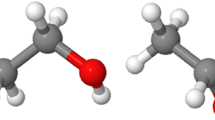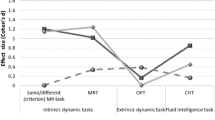Abstract
The present study contrasts 3 theories which provide explanations for performance improvement in mental rotation tasks. Wallace and Hofelich conjectured that the process as such may be executed more rapidly after training, while Bethell-Fox and Shepard attributed practice effects to the fact that images may be transformed first elementwise, but later as a Gestalt. In contrast, Tarr and Pinker assumed that a transformation of an image will no longer be computed after training but simply be retrieved from memory. Thirty-seven subjects participated in 3 test sessions in which they had to decide on the parity of 3-D block figures presented from different perspectives. Experimental group subjects underwent 4 additional practice sessions in which a subset of the figures and a subset of perspective views were used. Tests adapted to the predictions of the 3 theories revealed specific learning effects but no transfer, neither to old objects presented in new perspectives nor to new objects. This supports an instance-based explanation of practice effects which states that objects are represented in multiple perspective views.
Similar content being viewed by others
Author information
Authors and Affiliations
Additional information
Received: 7 May 1997 / Accepted: 6 August 1997
Rights and permissions
About this article
Cite this article
Heil, M., Rösler, F., Link, M. et al. What is improved if a mental rotation task is repeated – the efficiency of memory access, or the speed of a transformation routine?. Psychological Research Psychologische Forschung 61, 99–106 (1998). https://doi.org/10.1007/s004260050016
Issue Date:
DOI: https://doi.org/10.1007/s004260050016




